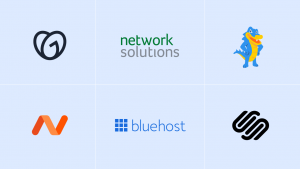Key takeaways
- A .ca domain strongly indicates a Canadian presence, building trust with local consumers and providing a significant boost for local SEO, which helps rank higher in Canadian search results.
- The .com domain offers universal recognition and trust which makes it the preferred choice for those planning future global expansion.
- Registering both the .ca and .com versions of your domain name is often the most strategic approach.
Choosing between .ca and .com isn’t just about picking what looks good. It’s about finding the right fit for your audience, goals, and growth plans. The extension you choose can influence how people perceive your brand, your local SEO, and your domain name’s availability.
If you’re unsure which one to go with, you’re not alone. This guide walks through the key differences between .ca and .com to help you choose the one that works best for your business.
What is a domain extension and why does it matter?
A domain extension, or a top-level domain (TLD), is the part of your web address that comes after the final dot like .com or .ca.
For example, in “www.yourbusiness.com,” the .com is the domain extension. These extensions categorize websites and offer clues about their nature or geographical affiliation.
There are two primary types:
- Generic top-level domains (gTLDs). These universally recognized extensions like .com, .org, and .net are open for registration to anyone globally, regardless of location.
- Country-code top-level domains (ccTLDs). These extensions are intrinsically linked to specific countries. Notable examples include .ca for Canada, .uk for the United Kingdom, and .au for Australia.
What is .com and who is it best for?
The .com domain is the most widely recognized top-level domain globally. Its historical legacy and wide usage, one of the original TLDs established in 1985, has made it a default choice for many online businesses.
The primary strength of a .com domain lies in its universal recognition. It instills a sense of familiarity and trust across international audiences, making it an excellent choice for businesses with global aspirations.
Ideal for:
- Businesses targeting an international audience. If your products or services cater to customers beyond Canada, a .com domain ensures broad appeal and recognition.
- Companies with future global expansion plans. A .com offers scalability, allowing you to expand your reach without needing to change your core domain.
- Established brands. Many established brands, even Canadian ones, use .com due to its widespread recognition and the perception of being a larger, more established entity.
What is .ca and why do Canadian businesses choose it?
The .ca domain is Canada’s official extension. It’s only available to Canadian citizens, residents, and businesses.
Established in 1987, the .ca domain was managed by the University of British Columbia. The Canadian Internet Registration Authority (CIRA) then took over its management in 2000.
Using .ca resonates with Canadian pride, developing trust among consumers who value homegrown businesses.
Canadian businesses choose this for:
- Businesses primarily serving the Canadian market. If your customer base is predominantly Canadian, a .ca domain resonates strongly with local sentiment and can enhance customer loyalty.
- Local businesses. For small businesses, brick-and-mortar stores, or service providers operating within Canadian communities, a .ca domain reinforces local ties.
- Local SEO enhancement. Search engines like Google often prioritize ccTLDs in local search results. A .ca domain can significantly boost your visibility for Canadian-specific searches.
- Canadian branding protection. Registering the .ca version of your business name prevents others from claiming it and potentially misrepresenting your brand within Canada.
.ca vs. .com: Pros and cons side by side
You’ll need to consider many factors when deciding whether to go for a .com or .ca domain extension for your website. These factors include SEO, branding, availability, and cost.
| FEATURE | .COM | .CA |
|---|---|---|
| Global reach | Offers a global reach, suitable for businesses targeting international audiences. | Primarily focused on Canadian users, which can limit international visibility. |
| SEO impact | No inherent SEO advantage for local targeting; more effort is required for local SEO. | Stronger local SEO benefits in Canada, improving visibility in Canadian search results. |
| Brand recognition | Widely recognized and trusted, adding credibility to your brand. | Reinforces Canadian identity, which can build trust and credibility with local consumers. |
| Domain availability | High demand and competition make finding desirable .com domain names challenging. | Easier to find available and desirable domain names due to less global competition. |
| Cost | Premium domains can be expensive due to demand, with higher costs for acquired domains. | Generally affordable with CIRA supporting Canadian internet initiatives, though domain prices can vary. |
| Local focus | No specific connection to Canadian identity or market. | Clearly signals Canadian identity, which can help foster local trust and connection. |
| Competition | High competition, making it harder to achieve high rankings, particularly for localized keywords. | Less competition locally, but could limit international competition and global brand presence. |
| Eligibility | No specific restrictions on registration. | Requires meeting Canadian Presence Requirements (must be Canadian or connected to Canada). |
| Global perception | Neutral and versatile, with no geographic bias. | May be perceived as having a localized focus, which could limit global perception. |
| CIRA support | No specific support structure like CIRA. | Registration fees contribute to CIRA’s Community Investment Program, supporting Canadian internet initiatives. |
Pros and cons of .com
.com domains offer several benefits, particularly for businesses wanting to establish a global presence. Their widespread familiarity and credibility can contribute to building trust and brand recognition.
However, they might not always be optimal for Canadian businesses targeting a local audience. The high demand for .com domains globally often results in limited availability of desirable domain names.
Here are the advantages and disadvantages of a .com domain extension.
Pros
- Global reach. .com domains have a wider reach and are suitable for businesses targeting an international audience.
- Established recognition. The .com extension is widely recognized and can add credibility to your brand.
- Perceived neutrality. .com is seen as a neutral and versatile option. This is suitable for businesses that want to avoid any specific geographical association.
Cons
- High competition. The popularity of .com leads to a highly competitive landscape. This can make achieving top rankings in search results challenging, particularly for localized keywords.
- Limited availability. Due to its widespread use, finding an available and desirable .com domain name can be difficult.
- Higher cost. Due to demand, premium .com domains can be more expensive. Or, you can acquire a taken domain but at a much higher cost.
- No local SEO advantage. Since its a global domain, it does not inherently signal a Canadian presence to search engines. You’ll need to put more effort into local targeting.
Pros and cons of .ca
The .ca domain is a powerful tool for Canadian websites looking to establish a strong presence in their local market. It offers distinct SEO benefits that boost visibility in local search results and attract local customers.
It also serves as a clear symbol of Canadian identity with its initials. This can help develop trust and connection with the local audience, especially among Canadian consumers.
Pros
- Enhanced local visibility. Search engines favor .ca domains for Canadian searches. This can help improve ranking in local search results and increase visibility among Canadian customers.
- Trust and credibility. A .ca domain reinforces your Canadian identity, which can develop trust and credibility with local consumers.
- Greater availability. Finding available and desirable .ca domain names is generally easier than .com.
- Improved local SEO. Signals to search engines that your content is relevant to Canadian users, boosting local search rankings.
- CIRA Support. Registration fees contribute to CIRA’s Community Investment Program, which supports initiatives to improve the Canadian internet.
Cons
- Geographic limitation. .ca domains might have limited visibility in international search results. This can be a disadvantage if you plan to expand your business globally.
- Eligibility restrictions. Requires meeting Canadian Presence Requirements, limiting who can register.
- Perceived local focus: While a .ca domain strengthens your connection with the Canadian market, it might inadvertently limit your perceived reach to a global audience.
What about pricing and availability
Prices for both extensions are generally similar, depending on the registrar and any promotions running at the time.
Some domain registrars, like Network Solutions, offer promotions such as a free .com domain for the first year when bundled with a hosting plan. It’s advisable to explore such offers to maximize value.
Cost range
The cost of domain names can vary significantly, but here’s a general idea:
- .com domains: Typically range from CAD $15-$25 per year for a standard registration, but premium domains can cost thousands.
- .ca domains: Often priced similarly to .com domains, ranging from CAD $15-$25 per year, though sometimes you can find promotional rates for the first year.
Note: Domain name prices vary widely depending on the registrar, promotional offers, renewal rates, and additional services. The prices mentioned here are typical ranges and may change over time or based on specific domain names. Always check with your chosen registrar for the most accurate and up-to-date pricing.
Which one should you choose for your business?
The choice of which TLD to get depends on your business needs, such as target audience, SEO goals, and growth plans. Each extension offers unique advantages and considerations that should be carefully weighed before deciding.
Choose .com if:
- Your target market is a global audience.
- You want a neutral and universally recognized domain extension.
- You’re comfortable with a competitive SEO landscape.
- You prioritize brand flexibility for international expansion.
Choose .ca if:
- Your primary focus is on the Canadian market.
- You want to enhance local SEO and attract Canadian consumers.
- You want to emphasize your Canadian identity and build trust with local consumers.
- You’re looking for a domain extension with more options.
Register your domain at Network Solutions
The right domain registrar is the key to a successful online journey. Having a reliable partner simplifies the process and secures your brand. From a smooth registration process to managing and securing your domain, your registrar plays a crucial role in ensuring everything runs seamlessly.
Experience top-tier domain security features, reliable customer support, and a user-friendly interface with Network Solutions.
Frequently asked questions
Absolutely! Registering both .com and .ca domains is a strategic move that offers several benefits. It lets you cater to local and international audiences and enhance online visibility.
It is possible but can affect your SEO rankings and brand recognition. Search engines need time to re-index your website under the new domain, leading to temporary fluctuations in search visibility. Moreover, changing your domain could disrupt your brand consistency and confuse existing customers. It’s advisable to consider these possible effects carefully if you plan to do so.
To register a .ca domain, you must be a Canadian citizen, permanent resident, or a legally recognized Canadian business or organization.
There are several alternatives to consider if your desired .ca domain is unavailable. You can look for variations of your preferred name or consider alternative top-level domains.




